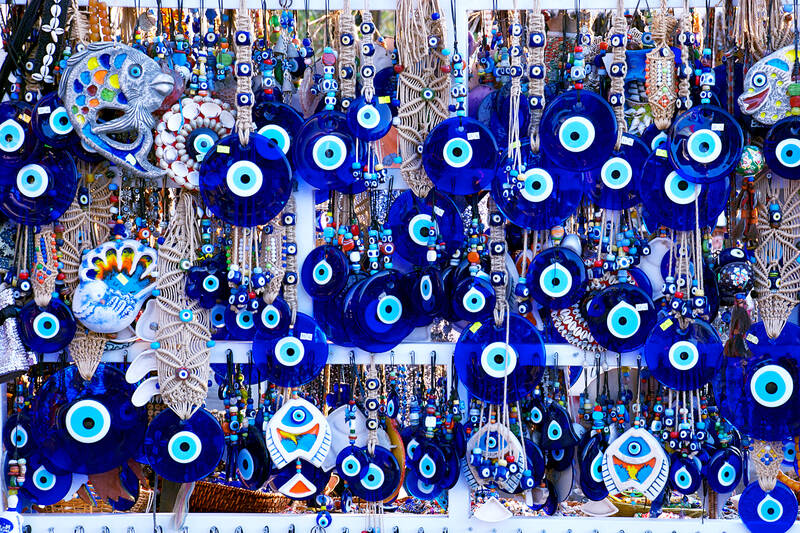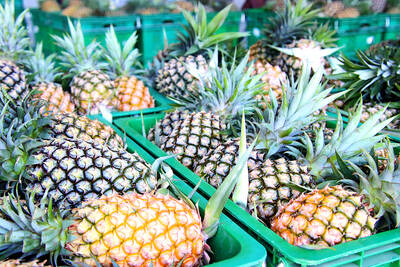Step into any corner of Turkiye, and you’ll likely encounter the iconic “Evil Eye,” known as “nazar boncu?u” in Turkish. This striking blue glass ornament is shaped like an eye with concentric circles of dark blue, white, and light blue. While its name in English suggests something threatening, it’s actually a charm designed to ward off misfortune.
The origins of the nazar boncu?u can be traced back to ancient Mediterranean and Middle Eastern traditions. The word nazar comes from Arabic, meaning “gaze,” while boncu?u translates to “bead” in Turkish. Central to the nazar boncu?u’s mythology is the idea that envy from others could transmit harmful energy through malicious glances. According to local beliefs, these ill-intentioned looks can inflict misfortune on a person or their possessions. It’s believed the nazar boncu?u absorbs and neutralizes these harmful intentions, effectively shielding its bearer.
The nazar boncu?u’s color and design are far from random. Blue has long been associated with divinity, peace, and protection in Byzantine and Ottoman traditions. It also symbolizes heaven and water, elements linked to purity and calmness. The circular, eye-like design is thought to keep constant surveillance and acts as a protective barrier against potential threats.

Photo: Wikimedia commons 照片:維基共享資源提供
The nazar boncu?u is seamlessly integrated into various aspects of contemporary Turkish life. It is commonly seen adorning jewelry, such as bracelets and necklaces, worn daily as a personal protective charm. Additionally, it can be found in homes, often hung on walls or placed in living spaces. Interestingly, when a nazar boncu?u shatters, believers interpret it as a sign that the amulet has accomplished its protective mission and must be immediately replaced.
The nazar boncu?u represents a living tradition that bridges Turkiye’s rich historical past and its vibrant present. For those in search of a meaningful accessory that embodies style and spirituality, the nazar boncu?u is the perfect choice.
踏入土耳其的任何角落,你很可能就會遇到標誌性的「邪眼」,土耳其語稱為nazar boncu?u。這個引人注目的藍色玻璃裝飾品呈現眼睛形狀,由深藍色、白色和淺藍色的同心圓組成。雖然它的英文名稱聽起來暗示著某種威脅,但實際上它是一種用來驅邪避凶的護身符。
邪眼的起源可以追溯到古地中海和中東地區的傳統。nazar一詞來自阿拉伯語,意為「凝視」,而boncu?u在土耳其語中意為「珠子」。邪眼神話的核心概念是,他人的嫉妒可能會透過惡意的凝視傳遞有害的能量。根據當地的信仰,這些不懷好意的目光會使人或其財產遭受不幸。人們相信邪眼能夠吸收並中和這些有害的意圖,從而有效地保護其佩戴者。
邪眼的顏色和設計絕非隨意。藍色在拜占庭和鄂圖曼土耳其傳統中長期與神性、和平和保護聯繫在一起。它還象徵著天堂和水,這些元素與純潔和平靜相關。圓形、眼睛狀的設計被認為能夠不斷監視,並作為抵禦潛在威脅的保護屏障。
邪眼無縫地融入了當代土耳其生活的各個方面。它常見於用來裝飾珠寶,例如手鍊和項鍊,作為日常佩戴的個人護身符。此外,它還可以在家中找到,通常掛在牆上或放置在起居空間。有趣的是,當邪眼破裂時,信徒們會將其解釋為護身符已經完成了它的保護使命,並且必須立即更換。
邪眼代表一種活生生的傳統,連接了土耳其豐富的歷史過往和充滿活力的現在。對於那些尋求既具風格又具精神意義的飾品的人來說,邪眼是完美的選擇。
MORE INFORMATION
concentric adj. 同心的
Mediterranean adj. 地中海的
Arabic n. 阿拉伯語
ill-intentioned adj. 惡意的
bearer n. 持有者;攜帶者
divinity n. 神性
Byzantine adj. 拜占庭的;東羅馬帝國的
Ottoman adj. 鄂圖曼土耳其的
seamlessly adv. 無縫地
adorn vt. 裝飾
amulet n. 護身符;避邪物
vibrant adj. 充滿活力的;活躍的
embody vt. 具體表現;體現
malicious adj. 惡意的;惡毒的
KEY VOCABULARY
1. striking adj. 引人注目的;驚人的
The striking sunset painted the sky with brilliant shades of orange and purple.
那引人注目的夕陽用燦爛的橙色和紫色渲染了天空。
2. ornament n. 裝飾品
The Christmas tree was covered with colorful ornaments and twinkling lights.
聖誕樹上掛滿了五顏六色的裝飾品和閃爍的燈光。
3. inflict vt. 使遭受
The typhoon inflicted serious damage on the coastal towns. 颱風對沿海城鎮造成了嚴重的損害。
4. shield vt. 保護
The sunglasses shielded Michael’s eyes from the bright sunlight. 太陽眼鏡保護麥可的眼睛免受刺眼陽光的影響。
5. random adj. 隨機的
The teacher asked a random student to answer the question. 老師隨機點了一位學生回答問題。
6. surveillance n. 監視
Privacy advocates argue that excessive surveillance can violate people’s basic rights.
隱私權倡導者認為過度監控可能侵犯人們的基本權利。
7. integrate v.(使)融入
Learning a new language can help people integrate into a different culture.
學習新語言可以幫助人們融入不同的文化。
8. shatter v.(使)破碎;粉碎
The explosion shattered all the windows in the building. 爆炸震碎了建築物裡所有的窗戶。
9. accessory n. 配件;配飾
Gina bought a stylish handbag as an accessory to match her outfit.
吉娜買了一個時尚的手提包作為搭配服裝的配飾。
學習音檔: https://magazine.english4u.net/Magdata/menu/styg0
《空中美語》雜誌APP免費下載: https://www.english4u.net/apps/index.aspx
免費收聽當月《空中美語》雜誌課文朗讀及解析 !
文章由AMC空中美語授權使用: https://www.english4u.net

A: What types of fruit enzymes should we take to help reduce eye floaters? B: According to a study published in the “Applied Sciences” journal by Taiwanese ophthalmologist Horng Chi-ting, pineapple, papaya and fig supplements can improve symptoms. A: Pineapples are in season now, so you should munch on more of those to get rid of floaters. B: Not quite. Enzymes can be damaged by our stomach acid if we eat the fruit directly. The doctor says taking fruit enzyme capsules is better for absorption. A: Most importantly, we should reduce our use of personal electronics to prevent floaters from

In Taiwan, 7-Eleven convenience stores can be found on almost every street corner. With over 84,600 stores across 20 countries, 7-Eleven has more locations than any other retail business on Earth. For millions of people, the chain is an important part of daily life, providing coffee, quick meals, and essential items for those __1__. The history of 7-Eleven began nearly 100 years ago in Dallas, Texas. In 1927, the Southland Ice Company began selling blocks of ice that were used to keep fridges cool. Shortly after opening, the company __2__ its offerings to include groceries like milk, eggs, and

Rice is essential to Japanese culture, tradition and politics. People take pride in the oval-shaped sticky Japonica grain, which is still a staple even though total consumption has fallen over the decades. But since last summer, prices have soared as supplies have fallen short of demand. The government has long paid farmers to cut back on rice acreage, and change to other crops to keep rice prices relatively high. To cope with shortfalls this year, the government has released rice reserves. But the grain has been slow to reach supermarket shelves. Anger over that was part of the reason the Agriculture Minister

Continued from yesterday(延續自昨日) https://www.taipeitimes.com/News/lang In 1946, the company adopted the name 7-Eleven to reflect its newly extended __3__, from 7am to 11pm, a novel concept at the time. As a rapidly growing company, it began offering franchise opportunities in the 1960s. In 1974, the first 7-Eleven in Japan was opened by the supermarket company Ito-Yokado. The Japanese franchises were __4__ successful that by 1991, Ito-Yokado was able to acquire a 70 percent stake in Southland Corporation. Its investments eventually resulted in full ownership of 7-Eleven, which paved the way for the Japanese company to enter the international market. Since then, 7-Eleven